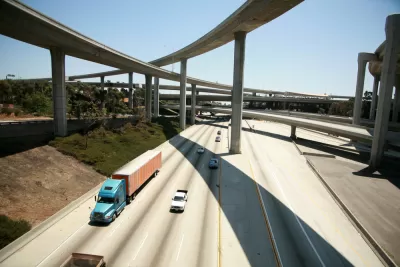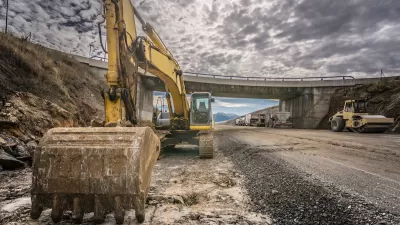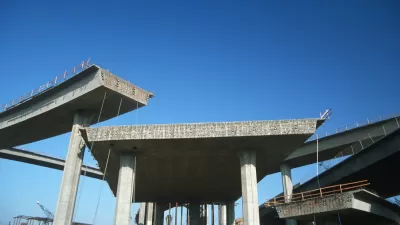The tide may be turning—albeit slowly—against new road construction and expansion in favor of more climate-friendly alternatives.

While many transportation agencies continue to expand highways, some major cities are shifting away from building more roads, bucking decades of car-centric planning. As Jared Brey reports in Governing, a few isolated cases are raising hopes that highway expansion will no longer be the status quo.
In Denver, a new rule from the Colorado Department of Transportation requiring metro areas to measure their greenhouse gas emissions prompted the Denver Regional Council of Governments (DRCOG) to reconsider plans to expand Interstate 25, opting instead to “focus on safety and traffic flow improvements over making the road bigger.”
Another notorious project, the proposed expansion of the 710 corridor in Los Angeles—a key route from the ports of Los Angeles and Long Beach to distribution centers—was officially canceled this May after decades of activism from local communities who experienced harmful health effects. According to the article, “Community groups created their own alternative plan for the 710 freeway, which focused on clean-energy transport of goods, public transit, bicycle and pedestrian infrastructure, improvements to the L.A. River — and no new general-purpose traffic lanes.”
Unfortunately, Brey points out that Denver and L.A. are still exceptions to the rule, and billions in federal infrastructure funding are still being funneled to road expansion projects around the country. Planetizen recently highlighted the annual Highway Boondoggles report, which details some of the biggest and most wasteful highway expansion and construction projects in the nation.
FULL STORY: Why Denver and L.A. Are Backing Away from Highway Expansions

Maui's Vacation Rental Debate Turns Ugly
Verbal attacks, misinformation campaigns and fistfights plague a high-stakes debate to convert thousands of vacation rentals into long-term housing.

Planetizen Federal Action Tracker
A weekly monitor of how Trump’s orders and actions are impacting planners and planning in America.

In Urban Planning, AI Prompting Could be the New Design Thinking
Creativity has long been key to great urban design. What if we see AI as our new creative partner?

King County Supportive Housing Program Offers Hope for Unhoused Residents
The county is taking a ‘Housing First’ approach that prioritizes getting people into housing, then offering wraparound supportive services.

Researchers Use AI to Get Clearer Picture of US Housing
Analysts are using artificial intelligence to supercharge their research by allowing them to comb through data faster. Though these AI tools can be error prone, they save time and housing researchers are optimistic about the future.

Making Shared Micromobility More Inclusive
Cities and shared mobility system operators can do more to include people with disabilities in planning and operations, per a new report.
Urban Design for Planners 1: Software Tools
This six-course series explores essential urban design concepts using open source software and equips planners with the tools they need to participate fully in the urban design process.
Planning for Universal Design
Learn the tools for implementing Universal Design in planning regulations.
planning NEXT
Appalachian Highlands Housing Partners
Mpact (founded as Rail~Volution)
City of Camden Redevelopment Agency
City of Astoria
City of Portland
City of Laramie





























